|
|
|
Sort Order |
|
|
|
Items / Page
|
|
|
|
|
|
|
| Srl | Item |
| 1 |
ID:
152532
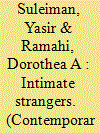

|
|
|
|
|
| Summary/Abstract |
This article explores the relationships between female converts to Islam in Britain and their close friends and family. It pays attention to the perspectives of converts but focuses on the reactions of their intimates to the conversion. We argue that converts become ‘intimate strangers’ through conversion—estranged on the level of understanding and belief but intimate on the emotional plane. This strangeness is symbolised by the Orientalist stereotypes associated with the converts. At the same time, friends and family shun engagement with the conversion itself, thus keeping alive the stereotypes and precluding understanding. In refusing to engage with matters of belief even within the intimate space of the family, secularism’s orthodox private/public divide gets busted where religiosity, instead, becomes an issue between the (individual) private and the (family) public. Lacking reciprocity and with no access to the inner depths of the people they are closest to, the liberal rhetoric of friends and family about personal choice and equal acceptance of all paths amounts to bigotry and turns out to be painful for both the converts and their intimates.
|
|
|
|
|
|
|
|
|
|
|
|
|
|
|
|
| 2 |
ID:
152535
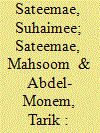

|
|
|
|
|
| Summary/Abstract |
Recent research on Muslim populations has offered interesting but limited insights about values preferences. This mixed-methods study examines the prevalence of support for patriarchy among a sample of religious Muslim university students in Southern Thailand using items from the World Values Survey. It also investigates the durability of these preferences by examining correlations between support or opposition to patriarchal values with preferences towards courtship practices, and elements that influence respondents’ views on gender roles, particularly related to the contemporary socio-economic and political situation facing the Muslim minority of Southern Thailand.
|
|
|
|
|
|
|
|
|
|
|
|
|
|
|
|
| 3 |
ID:
152531
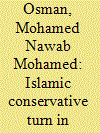

|
|
|
|
|
| Summary/Abstract |
In contrast to the allegedly puritan, ‘intolerant’ Islam practiced in the Middle East, Islam in Malaysia has always been portrayed especially in Western media as rather moderate. Given the fact that Islam in Malaysia has taken a conservative turn since the 1980s, such assertions are increasingly problematic. This paper attempts to explain the Islamic conservative turn in Malaysia and identify its social and political implications. It seeks to highlight how this conservative turn will impact Malaysian society and politics. An important impact that will be discussed in the paper is the emergence of neo-Sufi and neo-Salafi movements. The paper will end by examining the future trajectory of Islam in the country.
|
|
|
|
|
|
|
|
|
|
|
|
|
|
|
|
| 4 |
ID:
152534
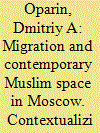

|
|
|
|
|
| Summary/Abstract |
Over the last fifteen years, the ethnic make-up of Moscow’s mosques has undergone significant change, while the number of practicing Muslims has grown manifold. These quantitative changes are connected with both the internal migration of people from the North Caucasian republics (a migration that had already begun in the early 1990s) and the external migration of natives of Central Asian states, primarily Uzbekistan, Tajikistan and Kirgizia (a mass migration dating from the 2000s). This paper is dedicated to two phenomena of contemporary Moscow Muslim life – the loud dhikr of the Kunta Hajji wird of the Qadiri tariqa, practiced by Chechens and Ingush; and the religious practices of the Central Asian “uninstitutionalized” mullas. Both spiritual practices are popular and have great significance for a considerable proportion of Moscow Muslims, including those who do not directly participate in them. What both practices have in common is also found in their marginal nature with regard both to institutionalized Moscow Islam and to the fundamentalist trend which is now gathering steam here. This is an attempt to identify some specific features of contemporary Moscow Islam through the analysis of certain practices.
|
|
|
|
|
|
|
|
|
|
|
|
|
|
|
|
| 5 |
ID:
152536
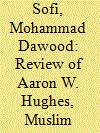

|
|
|
|
|
| Summary/Abstract |
Islam, its rapid spread and development and a wide variety of interpretations regarding its beliefs and practices, is a subject of vigorous debate and discussion both from theological and academic perspectives. Both these approaches are quite distinct—theological presentation of a religion differs from the academic presentation. In the former, religion is defined and explained by using religious terms, whereas, the latter while defining the religion employs various other terms other than religion itself that are derived from the academic disciplines such as history, sociology, etc. The book Muslim Identities: An Introduction to Islam by Aaron W. Hughes who holds the Phillip S. Bernstein Chair in the Department of Religion and Classics at the University of Rochester is an commendable attempt to introduce Islam and its development and diversity across the centuries to the religious studies students.
|
|
|
|
|
|
|
|
|
|
|
|
|
|
|
|
| 6 |
ID:
152538
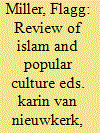

|
|
|
|
|
| Summary/Abstract |
This co-edited volume offers readers an exciting set of eighteen contributions by leading scholars of popular culture and Islam in diverse geographic settings. Each essay provides sustained attention to the trouble with totalizing and ahistorical accounts of religious formation. Racist and Orientalist stereotypes of Islamic orthopraxy are especially available for scrutiny, of course, given the Muslim world’s tremendous diversity and difference. More challenging is the task of avoiding neoliberal essentialisms about religion’s modern functions. Common assertions, whether in the West or not, include, for example, that religion is necessarily “bad” when swaying people toward fundamentalist retrenchment or extremism and conversely “good” and “true” if used to help people engage in reform without challenging underlying mechanisms of secular power. Editors change tack with a felicitous proposal at the book’s outset. Art, they remind readers, “is not inherently revolutionary, even if it does have the potential to encourage significant change.” If a book about popular culture can draw attention to the ways religious formations are integrally related to human artistic practice in local, transregional and global settings, Islam’s effects need not be made somehow uniformly epiphenomenal to dominant social and economic forces. Especially in the wake of the Arab revolutions, critical studies of popular culture can move beyond evaluating religious movements according to their relative success in calling authoritarian leaders to account.
|
|
|
|
|
|
|
|
|
|
|
|
|
|
|
|
| 7 |
ID:
152537
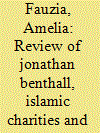

|
|
|
|
|
| Summary/Abstract |
Do charities flourish more in troubled times than in good times? The story of The Good Samaritan may be the first, and perhaps the best-remembered, illustration for those who agree that this is, in fact, the case. In responding to misery and hardships, human affection grows and humanitarian activities increase to ensure that assistance for the needy is moved through many channels. This phenomenon has been observed throughout history, including in Muslim societies and Islamic charities. However, the so-called ‘War on Terror’ (especially with its unjustified blacklisting of certain charities) has been a major source of problems for the existence of Islamic charities as well as for Muslim religiosity and identity. The current political crises in the Middle East have produced not only floods of migrants who flow out of countries in conflict zones, such as Syria, but also flows of charitable aid that arise in response to appeals and are delivered in response to these troubles. Islamic charities are thus put in a delicate position as a consequence of the suspicions that are directed towards them. In such cases and in such times, how do Muslims, Muslim communities, and Islamic charities respond to troubling events that are taking place in Muslim-majority countries and beyond? Do they respond and develop differently from Western and other faith-based charities?
|
|
|
|
|
|
|
|
|
|
|
|
|
|
|
|
| 8 |
ID:
152533


|
|
|
|
|
| Summary/Abstract |
The Shi’a Imami Nizari Isma’ili Muslims have often been considered the “poster child” for pluralistic integration (Cayo 2008). This ethos has been inculcated within members of the community, with its adherents seeing themselves as a diverse and multi-ethnic collective. Nevertheless, despite this purported pluralism, social research on the Isma’ilis has primarily focused on the diasporic and post-diasporic migrant communities of South Asian descent, the ‘first and second-generation immigrants,’ in the Euro-American context (Mukadam and Mawani 2006, 2009; Nanji 1983, 1986). The experiences of co-religionists in other contexts have often been neglected. This study examines how members of the self-described geographically and socially isolated Isma’ili community in Australia construct their identity vis-à-vis the larger, global, Isma’ili community, and how they have responded to the potential of identity threat given the arrival of another group of Isma’ilis with a differing migratory history integrating into the extant community. Using the approach of identity process theory, this study examines how salient features of identity are constructed amongst the Australian Isma’ilis, how religion and identity take on multiple meanings within the Australian Isma’ili context, and, finally, sheds light on the self-sufficiency of this community despite geographic and social isolation.
|
|
|
|
|
|
|
|
|
|
|
|
|
|
|
|
|
|
|
|
|